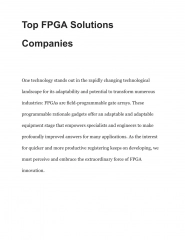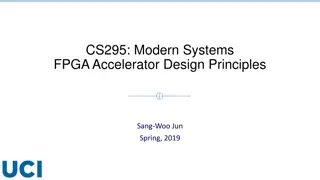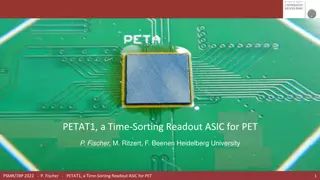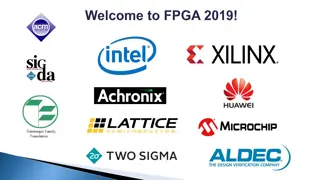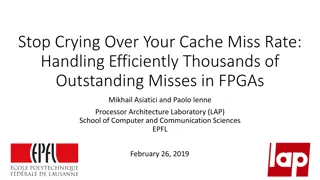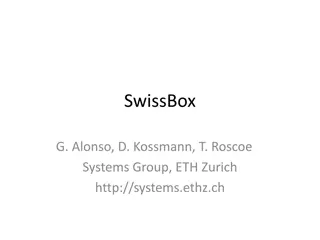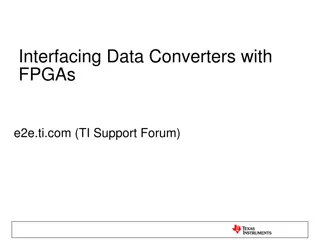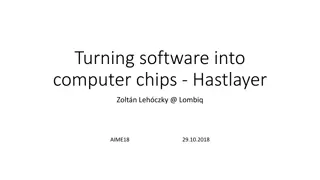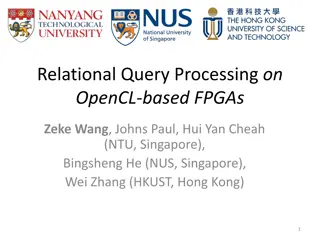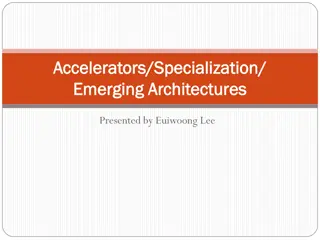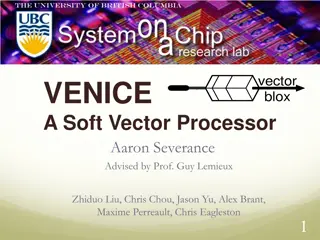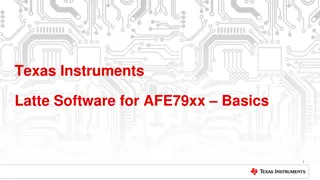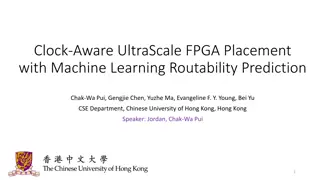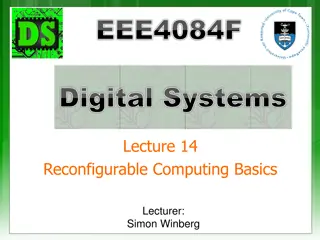Top FPGA Solutions Companies
In the rapidly evolving technological landscape, one technology stands out for its versatility and potential to revolutionize various industries: Field-Programmable Gate Arrays (FPGAs). These programmable logic devices offer a flexible and customizable hardware platform that enables engineers and de
1 views • 1 slides
FPGA Accelerator Design Principles and Performance Snapshot
This content explores the principles behind FPGA accelerator design, highlighting the extreme pipelining via systolic arrays that enables FPGAs to achieve high speeds despite lower clock frequencies compared to CPUs and GPUs. It delves into the application of Flynn's Taxonomy, performance snapshots
0 views • 17 slides
Advancements in PET Readout Technology: PETAT1 Time-Sorting Readout ASIC
Cutting-edge PET readout systems now utilize specialized ASICs for data acquisition from SiPMs, eliminating the need for FPGAs and reducing complexity, space requirements, and power consumption. The PETAT1 ASIC, developed by P. Fischer and team at Heidelberg University, enables time-ordered hit data
0 views • 18 slides
Exploring the Latest Trends in FPGA Technology and Applications
The ACM International Symposium on FPGAs brought together industry leaders and academia to discuss the rapid growth of FPGA technology in fields like machine learning, circuit design, and computing architectures. With insightful sessions, keynotes, and panels, the symposium highlighted the increased
0 views • 13 slides
Efficient Handling of Cache Miss Rate in FPGAs
This study focuses on improving cache miss rate efficiency in FPGAs through the implementation of non-blocking caches and efficient Miss Status Holding Registers (MSHRs). By tracking more outstanding misses and utilizing memory-level parallelism, this approach proves to be more cost-effective than s
0 views • 44 slides
Overview of SwissBox Project at ETH Zurich
SwissBox project at ETH Zurich, led by G. Alonso, D. Kossmann, and T. Roscoe, focuses on building a high-performance system called SwissBox. It encompasses hardware components like CPUs, memory, FPGAs, and storage, aiming to create a versatile computing platform. The project explores shared i-disk a
0 views • 18 slides
FPGA Data Ingest Processing for NARA Electronic Records
NARA's Innovative Systems Lab at the University of Illinois is exploring FPGA technology for electronic records management. The project aims to address challenges in data storage, retrieval, and integrity for long-term archival. FPGAs offer software-configurable chips with unique capabilities for on
0 views • 76 slides
FPGA Data Converter Interfacing Overview
Explore various I/O formats for interfacing data converters with FPGAs, including ADC parallel and serial formats like CMOS, LVDS, DDR. Learn about clock edge alignment, parallel, and true serial formats. Understand the differences between SDR and DDR, as well as considerations for clocking and data
0 views • 32 slides
Unleashing the Power of FPGAs: Hastlayer Transformation
Explore the innovative concept of turning software into computer chips through Hastlayer, a cutting-edge technology that enables logic to be expressed in both software and hardware. Discover the benefits of using Field-Programmable Gate Arrays (FPGAs) for parallel compute-bound algorithms, achieving
0 views • 19 slides
Relational Query Processing on OpenCL-based FPGAs
This study explores the efficient processing of relational queries on FPGA hardware using OpenCL, a programming language for heterogeneous computing environments. The evolution of FPGA architectures, optimization methods for OpenCL, and the benefits of kernel vectorization and compute units are disc
0 views • 38 slides
Exploring Accelerators and Emerging Architectures in Specialized Computing
Delve into the world of accelerators and specialized computing architectures with a focus on application-specific designs like GPUs and FPGAs. Discover the challenges of performance efficiency and generality in the Iron Triangle paradigm, alongside innovative solutions presented in recent research p
0 views • 61 slides
Exploring Overlay Architecture for Efficient Embedded Processing
The research delves into the implementation of overlay architecture for embedded processing, aiming to achieve optimal performance with minimal FPGA resource usage. It discusses motivations for utilizing FPGAs in embedded systems, the challenges of balancing performance and resource utilization, and
0 views • 24 slides
Texas Instruments Latte Software Overview
Texas Instruments Latte software, commonly referred to as Latte, is a collection of Python scripts used to configure EVMs and create configuration scripts for application boards like FPGAs. It supports multiple devices, has Core and Library components, and is stored in a folder named "Latte" in the
0 views • 13 slides
Clock-Aware UltraScale FPGA Placement with Machine Learning Routability Prediction
The research focuses on addressing the challenges of clock constraints, routability, and wirelength in UltraScale FPGAs. Various placement techniques are introduced, such as two-step displacement-driven legalization and chain move, to optimize performance. The study incorporates different routabilit
0 views • 31 slides
Reconfigurable Computing Basics and Trends Overview
Reconfigurable Computing (RC) is gaining popularity as software processors face limitations in speed and parallelism. FPGAs offer a solution by implementing complex functions and enabling spatial computation. The course covers RC basics, Verilog introduction, and dual processing techniques for verif
0 views • 16 slides
